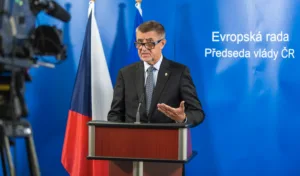Brussels–While Renew Europe was planning to try to counter-overtake the European Conservatives and Reformists (ECR) group as the third force in the EU Parliament, a cold shower came from Prague for European Liberals. “Based on the negotiations, we came to the conclusion that Renew and ALDE simply have different positions than the ANO movement,” said the Czech former Premier and leader of the controversial populist party of liberal-conservative orientation ANO 2011 (Action of Dissatisfied Citizens), Andrej Babiš, who today (June 21) in the House of Representatives of the Czech Republic permanently ended his party’s experience in both the Alliance of Liberals and Democrats for Europe (ALDE) party and the Renew Europe group in the European Parliament.

“We run the campaign to fight illegal immigration, to change the Green Deal, which is destroying European industry and agriculture, and negatively impacting our citizens,” attacked Babiš, who is well known in Brussels, especially for his conflicts of interest when he was Prime Minister of the Czech Republic between 2017 and 2021. But the real breaking point that prompted the leadership of ANO 2011 to decide on its exit from the European family of Liberals is the one involving the contrast with the pro-European and federalist positions of the ALDE and Renew Europe. A political knot that (for years) has not been possible to solve, as the President of Renew Europe’s group in the EU Parliament, Valérie Hayer, said, commenting on the news from Prague: “This divorce is long overdue. ANO has chosen a populist path incompatible with our values and identity.” In particular, “in the last month, their divergence from our values has increased exponentially, and we have witnessed it with great concern,” the French MEP stressed, reiterating that “ANO’s departure strengthens our pro-European values and our unity.”
A clear wink to the five Volt MEPs, who have already expressed their intention to remain in the Green/ALE group but are waiting for members’ response for a possible switch to the Renew Europe group (communication will come the morning of on June 24). The road is all uphill, but with the farewell of ANO 2011, European liberals will try to play all their remaining cards to convince the two Dutch and three Germans of the soundness of their pro-European project. With the critical issue of the presence of the seven Czechs solved, however, the question of the Dutch liberals’ green light to government with the far right in the Netherlands remains. After suffering the surge from the conservative right on Wednesday (June 19) as the third group in the European Parliament, Renew Europe found itself with three seats to make up – 180 to 183 – and only yesterday (June 20) he Belgium’s Yvan Verougstraete of Les Engagéshad announced his entry, bringing it to 181. But the Czech party’s exit dashed hopes of a comeback, with the Liberal group now having 174 members (-9 from ECR and +16 from the far-right Identity and Democracy).

As for ANO 2011’s final destination, there is no group on the horizon ready to accept it. Babiš explained to reporters that the party will decide “in the coming weeks.” However, he already ruled out joining the ECR as a solution: “Representatives of other Czech political parties have a big say, and the ECR is certainly not our choice.” The reference is specifically to the Civic Democratic Party (ODS) of Prime Minister Petr Fiala – which within the conservative right-wing group has three members – one of Babiš’s biggest political opponents. On the other hand, regarding an – unlikely – approach to the European People’s Party (EPP), sources within the group call the possibility of an entry “absolutely absurd,” also recalling the parliamentary inquiries in Brussels conducted at the time when Babiš was Prime Minister of the Czech Republic. At the moment, the most likely option is for the seven Czech MEPs to end up in the group of non-aligned, relegating themselves to political irrelevance, even if the leader of ANO 2011 suggested that they should beware of a “new group that will perhaps emerge.” The 10 Hungarians from Fidesz are also homeless in the EU Parliament, and on many issues, the positions of Babiš and the Hungarian premier, Viktor Orbán, are not so far apart.
English version by the Translation Service of Withub










